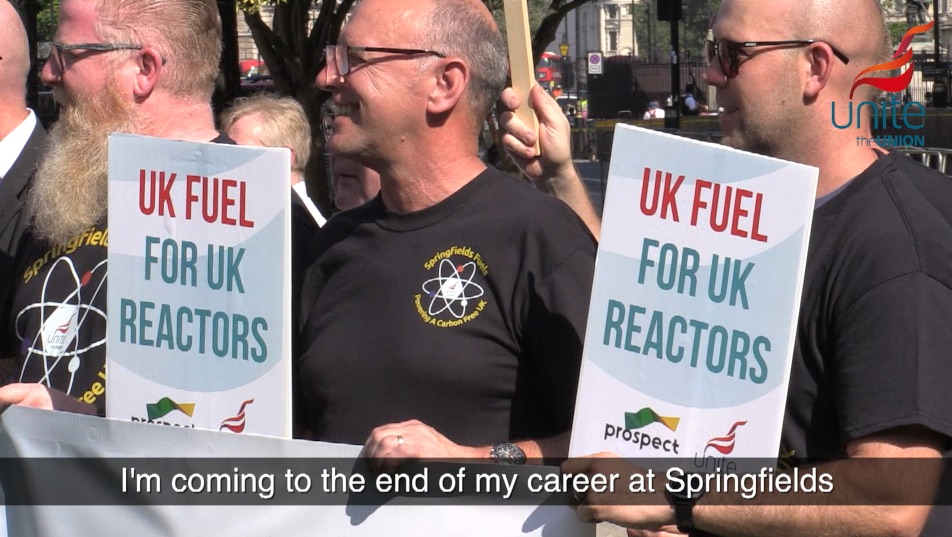Holding back the tears
Britain’s last deep pit coal miners held back their tears, as they emerged from their historic final shift underground to face the glare of the media at Yorkshire’s Kellingley Colliery on Friday.
The decision to close the pit in 2013 was followed by slew of attempts to save it, including a search for new investors, a proposed workforce buyout and an application for EU state aid.
Despite the efforts, the decision was made to close Kellingley, even though there are over 30 years of reserves left.
The three coal-fired power plants within eye-shot of the colliery, and others around the country, are now reliant on cheap foreign imports from as far away as Columbia and China – a position that the miners and Unite say is untenable.
For George Lamb, Friday marked the last day of a 43 year career spent at the pit. Like the 450 other miners losing their jobs, his sadness at the loss of a way of life was mixed with anger at the senselessness of the decision.
Disaster for UK
“It’s disgusting that they’re letting it close. It’s a disaster for the country. We’re just importing coal we already have. And what we’re doing by importing coal is subsidising another country’s workforce and abandoning our own. That can’t be right,” said Mr Lamb.
As for the high CO2 emissions that come from coal, Mr Lamb pointed to the cancellation of the carbon capture project at the nearby Drax power station in September, because of government cuts to renewable energy subsidies.
Even without the technology Drax will continue to burn 4m tons of coal a year for the next 10 years – coal that requires even more CO2 emitting fossil fuels to be burnt so it can be transported across the globe.
“Drax isn’t closing for another 10 years and there’s at least 30 years of coal at this pit,” said Mr Lamb. “They could have kept this pit open to supply Drax.
“As regards climate change they could invest in carbon capture the same as they are doing in Germany and other countries,” he added.
“I think the Tories have got what they always wanted. From 1979 when Thatcher got in, up to now.”
Clocked off
Emotions were running high as the miners clocked off for the final time in the lobby of the colliery.
Generations of deep pit mining were coming to an end, as were the often decades long working relationships of men who kept each other safe in dark and dangerous conditions miles underground. There was horse play and high-jinks among the men, but their loss and the looming of an uncertain future hung heavy in the air.
“I’ve been here since I was 17 and I’m 49 now. My father and all my family’s worked down pit. My brother’s pit shut and now he’s working in a warehouse. I don’t know what I’m going to do. It’s just awful,” Mark Bainbridge said, as he stored equipment away in the lamp room for the very last time.
Employment prospects for many of the miners will be limited. Their average age is 51 and with the Eggborough power station facing a stand-by only role in case of black outs and the Ferrybridge power station due to close in March, competition for jobs in the region is increasing.
Adding to the pressure is the erosion of the miners’ pensions and an ungenerous 12 week redundancy package, that is actually worse than the one offered under Thatcher.
Let down
“They’ve been treated horribly. They’ve been let down, it’s absolutely disgusting what’s happened to these lads” said Kellingley National Union of Mineworkers (NUM) branch secretary, Keith Poulson.
With Kellingley closed, Mr Poulson became the last NUM deep mine branch secretary, although he thinks this will have to change in the future if Britain is to have a functioning energy network.
“It’s a legacy I don’t want to be burdened with. I don’t want to think I am the last branch secretary, but I am – as far as history goes today. I hope somebody is going to reverse that, because in the near future we are still going to want coal,” Mr Poulson said.
It’s a position supported by Unite, who point out that ministers are more interested in cutting treasury budgets than shoring up Britain’s future energy security.
At present, 31 percent of the UK’s electricity supply comes from coal and by next year that number is expected to be reduced a third. This is despite slim power reserves – especially during cold weather â€snaps’ – and a dangerous reliance on an increasingly insecure global energy market.
That’s why Britain should not abandon its huge domestic coal reserves, said Unite national officer for the coal sector, John Allott.
“The jettisoned £1bn carbon capture and storage (CCS) competition by chancellor George Osborne last month would have given coal a real future, while keeping carbon emissions within EU limits. This technology is already used effectively in Canada and Sweden,” Mr Allott explained.
“Energy and climate change secretary, Amber Rudd, does not seem to have a grip of her portfolio and appears to be rudderless under the weight of treasury pressure. Coal is a victim – as are the dedicated workers at Kellingley – of this policy of drift, cutbacks and short-sightedness.”
Although deep pit mining is off the books for the foreseeable future, Unite is fighting to keep UK surface coal mining alive, so that with the use of CCS Britain’s energy security can be maintained.
Pic of last miners by Mark Pinder
 Like
Like Follow
Follow


